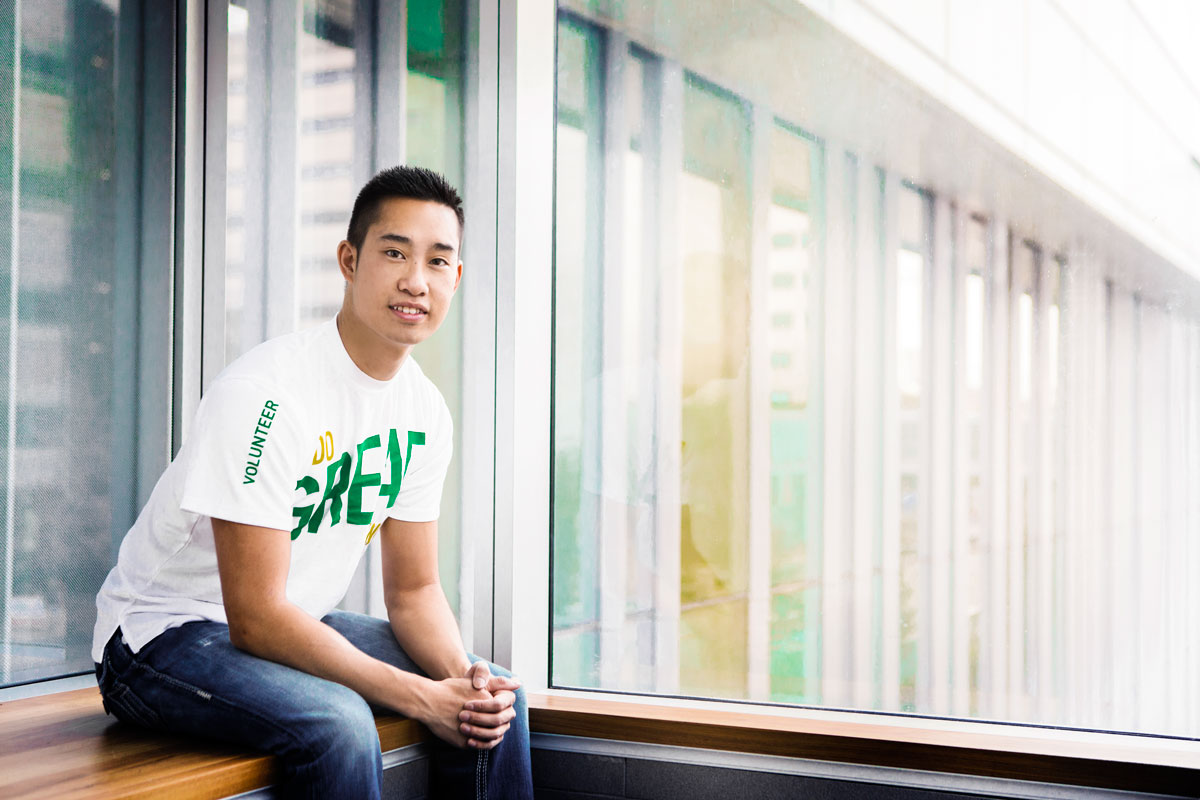Harold Pang, '12 BSc, '14 BScN
Harold Pang, '12 BSc, '14 BScN, is just starting his career in health care after graduating with a nursing degree. He stays involved with the campus community by volunteering with the Wellness Project, an initiative established in early 2013, funded by Alberta Health, which aims to help create a culture of wellness at the University of Alberta. Harold believes volunteering has led to a stronger skill set he can bring to his career, as well as helping him stay engaged with the community.
Tell us how you stay connected to campus through volunteerism.
I have always been involved on campus during my undergraduate degree, either through volunteering or just participating in campus events. I currently stay connected with the university by volunteering my time with the Wellness Project as a grant adjudicator. The Wellness Project aims to build a healthy campus through community engagement. By volunteering, I feel that I am able to continue contributing to the campus after six years of education.
Why do you think it's important for grads to volunteer their time?
Acquiring a degree from the University of Alberta is not a simple task and graduates should feel proud to have attained their education from the U of A. The university is an enormous community and maintaining connections with the campus provides a lot of future opportunities. I believe the best way for people to stay connected with their roots is to volunteer on campus.
Do you volunteer for other organizations? Where?
I currently don't volunteer with other organizations, as I am focusing more on my career. I fully intend to pursue other volunteering opportunities once I establish myself in the working world. One organization I plan to volunteer with is the Canadian Red Cross, as part of their Emergency Response Unit for international emergencies.
What impact has volunteering had on you? On others?
A key word comes to mind: balance. I cannot describe all the personal growth I have gone through by volunteering. Ultimately, it makes you a well-rounded person. You learn how to communicate, work together in a team, solve conflicts, network, time-manage, and to be an open-minded individual. Along with school and work, you learn how to live a happy life by finding that balance - even when you're stressed.
How has it impacted others? In terms of humanitarianism, I have directly and indirectly influenced individuals and communities. Some examples would be walking people with Safewalk; organizing the Bissell Centre Gift Wrap with Circle K which raised $6,200 for low-income families; joining the U of A photography club; sitting on the General Faculties Council; serving as president of the Health Science Students' Association; and adjudicating grants on The Wellness Project. You can choose how you want to impact others and for what reason.
What advice would you give to people looking to volunteer?
If you have time to spare, what's a better way to learn about yourself than to volunteer? Find things in life that you truly value and discover an organization that aligns with your values. At this moment, I value the U of A community and the health, nutrition and physical/mental well-being of individuals. The Wellness Project directly aligns with my current values.
Share a story or a memory from your time volunteering.
This story is from one of my first experiences as a volunteer and was not in the campus community. I believe it's a story worth noting because it had an impact on the way I viewed life and volunteering, in general. I was part of Scouts Canada when I was younger, about 12 years old. There was one time where our squadron went to a seniors' residence to provide them company. I was young and it was my first time volunteering so I didn't understand the importance of visiting with the seniors. The first day I was there, I listened to one of the resident's life history and found it to be pretty interesting. I had kept him company by pushing his wheelchair around and chatting with him. I stayed with him until the end of the day and we bid our farewells. I told him that I would be back.
We went back the following week and I was excited to continue the discussion with my older friend. I got to the residence and the resident co-ordinator there told me that my senior "buddy" had sustained a stroke. I didn't really understand this concept at the time, so I wanted to find him and see what changed. When I found him, he was getting fed by one of the nurses, a task that he was able to do by himself the week before. He also tried to communicate with the nurse, but I could tell he couldn't talk effectively anymore. My new friend changed so dramatically over the course of one week!
This experience really impacted the way I felt about volunteering. It showed me that kindness to another human being is important and even the simple task of keeping another person company can mean a lot to them. It also showed me the value of human life, and how fragile it is. Twelve years later, I still recall this early experience of volunteerism and it definitely affected me in a positive way.
On average, how many hours a month do you volunteer?
Currently, my time volunteering is minimal but I plan to volunteer more in the near future. With that said, prior to graduating, I was volunteering at least 50 hours a month.
Is there anything else you would like to add?
Always find a way to grow because learning doesn't end after you graduate. Involve yourself with different people, groups, organizations and communities. If you're not growing, you're stagnating.
